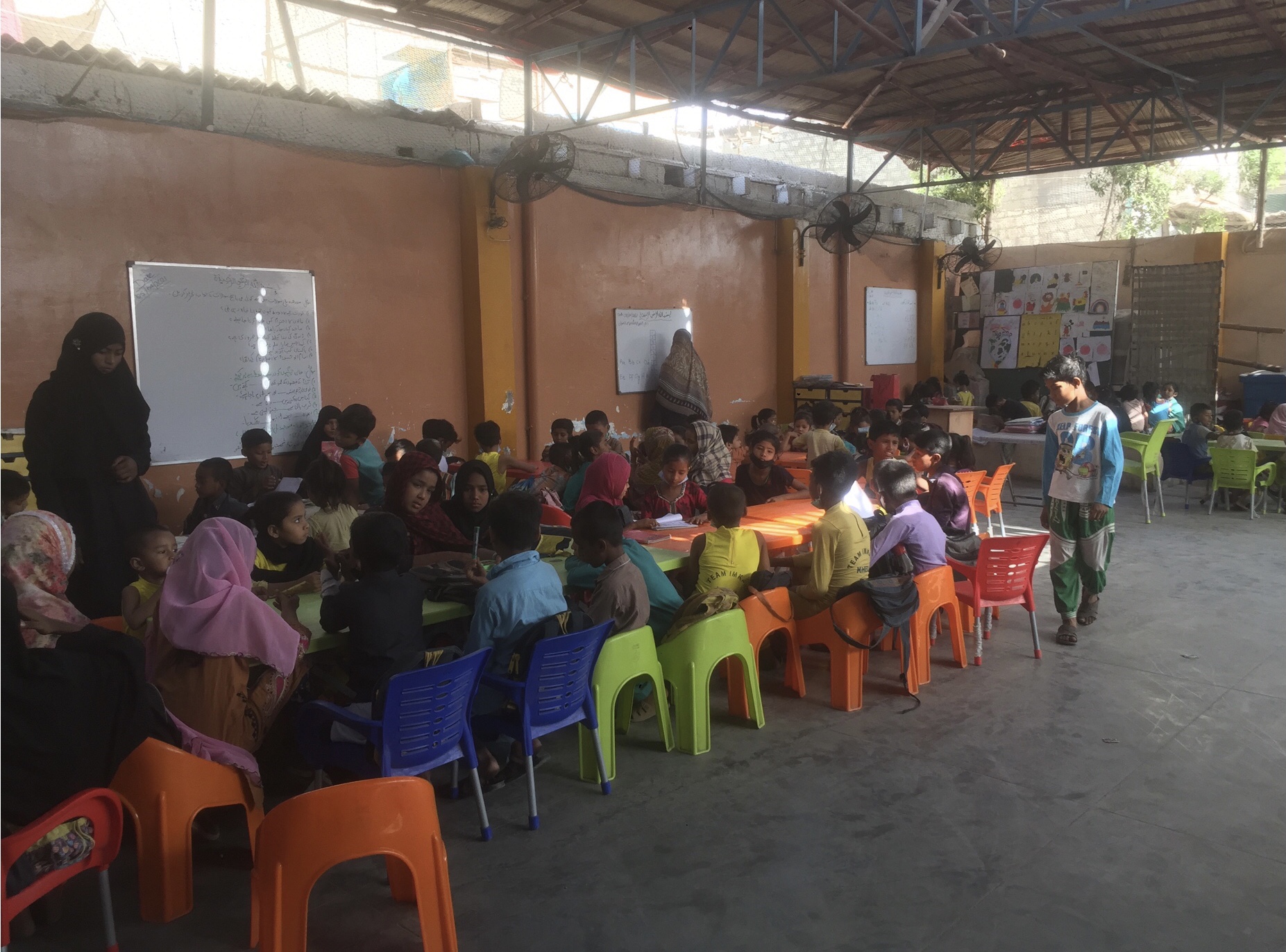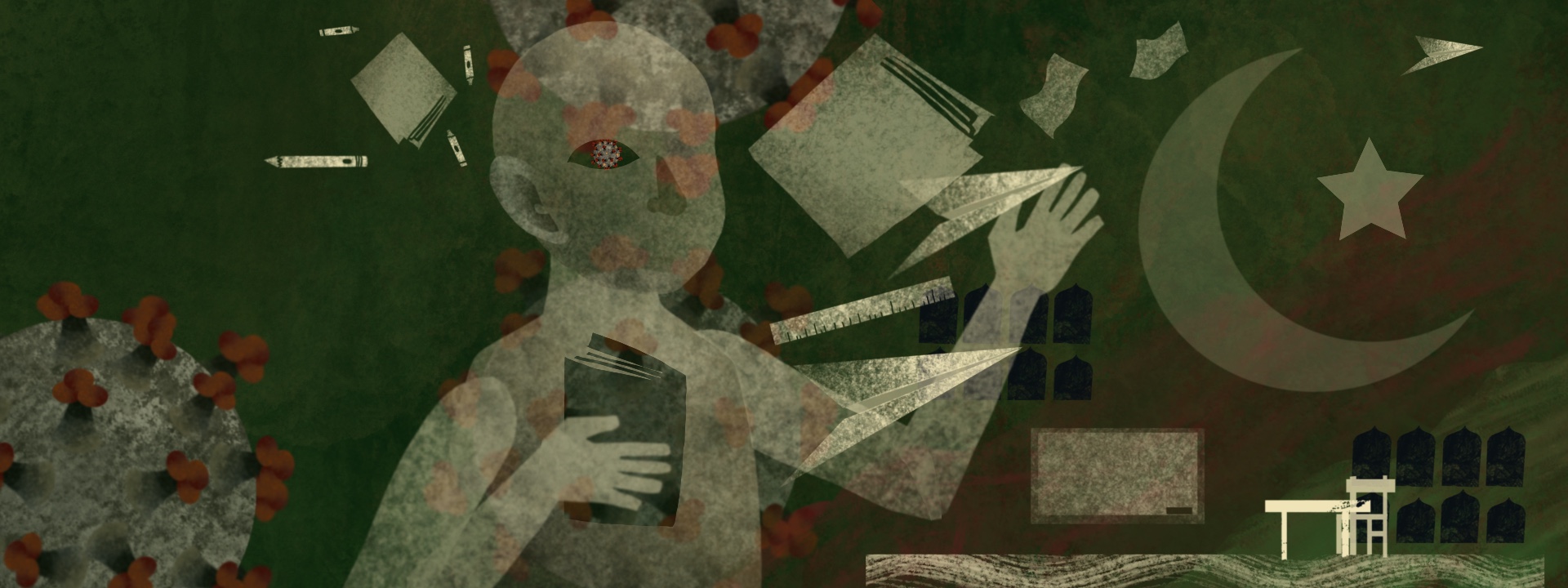His name is Rizwan and he tells me he is a Grade One student. He doesn’t know how old he is. His school is run by a non-profit organization in Machar Colony, the largest slum in Karachi, and which teems with at least 300,000 people. The school is actually just one open hall; whiteboards, chairs, and tables dominate one side while the other seems to be dedicated for physical activities. It has 170 students at present, attending classes at kindergarten to Grade Three level, although the children themselves have ages that range from four years to 15 years old.
Today there are about a hundred children in the hall, varying in age, and in all shapes and sizes. While Rizwan focuses on the day’s lesson, children dressed in yellow tights and shirts line up at the back of the hall, cheering for their gymnastics teacher who has just entered the school gates. Mattresses are thrown on the ground and the children start their practice, running and jumping, perfecting how to regain their balance after a somersault.

The girls’ team won first place in an inter-school competition this year. The children have also participated, by remote, in an international cheerleading competition. After this pandemic is over, they dream of traveling, meeting fellow gymnasts from other countries, and participating in the competition in person. But it won’t be that simple. Even after COVID-19 is no longer the menace it currently is, Rizwan and these children will still not be recognized as legal citizens of Pakistan, the country of their birth. That means they do not — and may never — have any form of travel document, such as an identity card or passport, which says that they are Pakistani.
Students at the Machar Colony school, practicing their somersaults. Video by Haniya Javed.
There has been no official count of people without state identity cards in Pakistan, but the estimates run to some three million in total. In general, these are individuals who trace their roots to Bangladesh, Myanmar, and Afghanistan. Those with Afghan ancestry are scattered all over the country, although many of them live in Khyber Pakhtunkhwa province and Balochistan. The migrants from Bangladesh are mostly in Sindh province, predominantly in Karachi city, as are those from Myanmar.
In 1971, war had broken out between East and West Pakistan. After it was over, what was once one country became two: Pakistan and Bangladesh. The war’s end saw thousands of people moving to Pakistan. Many of the migrants established legal status in the country then, but over time their cards were either blocked or revoked, and they somehow ended up being labeled as “aliens.” At present, the government maintains that migrants should have proof of migration or residence before 1978, to distinguish between those who moved to Pakistan at the time of the war, and those who got here later, presumably — or so the government seems to think — to seek economic prospects.
 Lost rights and unfulfilled promises
Lost rights and unfulfilled promises
Many like Rizwan actually have the right to birthright citizenship regardless of their ancestry. But decades of state indifference along with discrimination at the hands of government employees have helped little to persuade most of them to fight for what is their right. And so those who began life here in dismal conditions have been unable to move even an inch up. Entire communities haven’t been able to break the cycle of poverty or assimilate with the rest of society as access to things like education and health are tied to one’s identity. And with statelessness meaning practically no access to vaccines, the pandemic may well have no real ending here either.
Over the years, numerous political groups in Karachi had voiced support for ensuring identity of the members of Pakistan’s migrant communities. In 2018, after becoming Prime Minister, former star cricketer Imran Khan had stressed the importance of forming a policy to help the scores of stateless individuals who had already lived for decades in this country. The new premier’s statement sparked hope among many in Machar Colony who felt it had been a long time coming from the national government. Since then, however, there has been no development on the matter.
On the request of his teacher, Rizwan accompanies me as I make my way from the school to a healthcare clinic. As we walk along, carefully avoiding the sewage and trash on the street, I ask him if he enjoys school. He says he likes to read and write. What would you like to do when you grow up, I ask. “I want to be a ranger.” Why a ranger? “My older brother is a ranger and last week there was a big fight in our street. There are fights happening here all the time with people beating each other up. He came with his team and stopped the fight. I want to stop the fights, too.”
Rizwan is talking about law-enforcement rangers. They are a paramilitary force launched in the ‘90s to maintain law and order in the city. The chances of getting into an occupation like that for a stateless person are very slim. It’s possible that Rizwan’s brother somehow managed to secure an identity card even if Rizwan still doesn’t have one. In some families, certain members have it while the others don’t.
That could also mean Rizwan’s ranger brother may have reached a higher level of education than other members of their community. Most don’t make it beyond matriculation as they don’t have identity documents to enroll for classes or sit for exams in the local education system. Not surprisingly, the community itself has no college for those who want to further their education.
From the very start, the community’s children are aware that educational and employment opportunities are scarce. Drugs are a problem. But families try to work together to survive. Boys follow their fathers to boats to catch fish. If they are lucky, they are paid half the value of their catch. If they aren’t, they get nothing. Girls marry early, many in their teens, and become part of the informal industry of shrimp-cleaning. Women peel shrimps for which they are paid PKR100 (63 U.S. cents) for a set number of bucketloads. Their hands bristle and are red from the shrimps’ spikes.

Young children play about in the streets barefoot, so children with fungal and bacterial infections on their feet show up routinely at a clinic run by a non-profit group. Dr. Samina Khawer, who works in the community, says, “I see at least 70 adult and children patients daily with ringworm disease and eczema. The occurrences are definitely more in the summer season.”
Ringworm disease, transferable during pregnancy and through skin-to-skin contact, has entire families under its grip. “Even when a patient comes to me with flu, you can see skin allergies in their medical history,” the doctor says. “We recommend skin lotions and ointments, but we see lack of hygiene as a problem.”
Diseases and the “drama” that is COVID-19
A daily shower with clean water, wearing clean and dry clothes, keeping soaps and brushes separate, and wearing footwear in an area with no proper sewage system are essentials many in the community have never enjoyed. The living and working conditions in the Colony have also given rise to hepatitis C, which could potentially lead to liver cancer. Pakistan has the second highest number of hepatitis C in the world, with at least five percent of the population of 225 million infected. The disease is passed on through the reuse of needles and blades, as well as through unsanitary living practices.
Symptoms appear very late into the disease. “Most of the infected people are not aware that they are carriers,” says Shamshad, a medical supervisor at a maternity clinic in the community. “Many don’t share that they have hepatitis when delivering babies, as they may have to be referred to other hospitals where high cost of treatment and identity remain a challenge.”
As for coronavirus, very little is known about it at Machar Colony. So far, COVID-19 has killed some 23,000 in Pakistan, and nearly 990,000 have been infected with the virus in this country. But one elderly man at the Colony says that it’s just a “new drama” set up by the West. A schoolteacher who grew up here says that the virus seems real, but “at Machar Colony we don’t have it all.”
The schoolteacher has no teaching certificate, but she has finished 10th Grade, which few girls here are able to accomplish.
“Our diet is mainly fish,” she says. “It gives us good immunity.”
Another Colony resident says that she doesn’t know much about the virus. Standing near the school, she stretches her arms forward, her palms face up. “There is no ration at home,” she says. “How worse can corona be for us?”
How much worse, indeed. Machar Colony is just one among more than 100 settlements in Karachi where the stateless open their eyes for the first time and where they also breathe their last. Returning from the community, one carries back the energy of the place in the form of the stench of fish and shrimps. But while a visitor can wash one’s clothes, get rid of the fishy stink, and wriggle oneself out of the feeling of a parallel yet so alienated life in existence, the inhabitants of Machar Colony cannot. For them, the Colony is their entire universe, where they are known to each other even as they remain unrecognized by the state.
“We have spent our lives with how ever we had to,” says Safoora, who cleans shrimps for a local exporter. “I just wish my children could have a different life than us.” ●
Haniya Javed is a Pakistani independent journalist covering human rights, labor migration, and environment. She tweets @haniyajaved1.



















